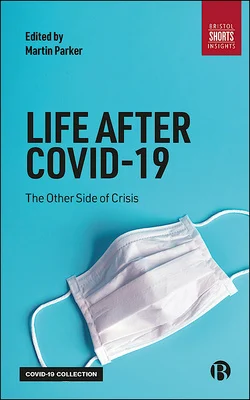Five years since the first wave, another aspect of the impact of COVID-19 is in danger of being forgotten – the loss of the idea that we might build back better. While business as usual was shut down, why didn’t we move to a low carbon, high inclusion, high democracy economy that didn’t repeat the mistakes of the past?
There was a definite optimism in some circles. I edited a short book called Life After COVID-19 with suggestions about different working patterns, less air travel, the localisation of food systems and redesign of cities, even different ways of relating to each other and to nature. The influential novelist and writer Arundhati Roy called COVID-19 a ‘portal’ to another way of being. So what went wrong? Why did we not learn from the virus?
The pandemic was a terrible global event which has killed at least seven million people and left many others with life changing conditions, but it also did inspire many to imagine a different future. Looking back now, the tragedy is that it seems to have made so little difference. Despite what various people claim, social and economic change doesn’t simply happen because of ‘hope’, though it is difficult to imagine it happening without it. Yet now more coal is being burnt, more planes are flying, oil companies are backing away from renewables and the rich are getting richer.
A common story is that it takes a crisis to reset social and economic relations. War, famine and pestilence then become the shocks which remake the world, speeding up technological innovation and redistributing populations. In Kim Stanley Robinson’s novel Ministry of the Future an extreme heat event in India is the trigger which leads to a series of global interventions aimed at reducing carbon emissions. The virus could have been that crisis, but we seem to have slumped back to business as usual, so perhaps the crisis wasn’t severe enough?
The problem with the ‘crisis theory’ is that is that, in terms of climate change, it means waiting until it’s too late before much gets done. The gradual and dispersed nature of global heating, what the philosopher Timothy Moreton calls a ‘hyperobject’, means that it is difficult to see from the perspective of one life, one town, even one country. It might take New York getting flooded, as it does in another Kim Stanley Robinson novel, or entire countries being ravaged by extreme weather events before catastrophes get turned into opportunities.
However, something which is clearer to see are the social and economic relations which are incentivising global economy actors to ignore climate change, and perhaps it is these that might stimulate clearer thinking about the strategy for getting through the portal. As the Brazilian environmentalist Chico Mendes said, green politics without an understanding of capitalism is just gardening.
The concentrations of wealth and power which now surround Trump, Xi, Modi, Putin and others are very visible demonstrations of the inequalities of the present global system. Whether continuing to extract gas and coal, dominating the media and tech space, or encouraging online hyperconsumption, the overall effect of this economic concentration is to make the rich richer and continue to exacerbate the climate and ecological crises.
The fortunes of billionaires rose during the pandemic, sedimenting the inequalities of the new world order and ensuring that the poorest on our planet will suffer most from the climate and ecological crisis. These yawning gaps between the haves and the have-nots are clearly visible in a way that climate change is not, but the two phenomena are intimately connected. Putting it bluntly, if we are to do something about carbon capitalism, then this means addressing the vested interests of wealthy and powerful people and corporations.
So what is to be done? As a few recent books have suggested, social change can and does come about without waiting for a crisis. The patient work of global activists pushing for women’s rights, or the civil rights movement in the USA, or trade unionists struggles for legal protections for workers were all the result of grassroots politics by multiple people and organizations moving in similar directions over many years. It is difficult, in any of these examples, to locate a single moment or place where they began, and misleading to suggest that they have now ended in victory.
That is the danger of waiting for a crisis, whether a microscopic virus or a climate hyperobject, a lockdown or wildfires in California. It is activists who will make the change. There is no portal to another social and economic order that does not involve a messy and endless engagement in politics and economics. Marking time until the reset will not help, and that’s the real lesson we should have learned from the virus. As the SF writer Octavia Butler put it – ‘We don’t have to wait for anything at all. All we have to do is start.’
Martin Parker is Professor of Organization Studies at the University of Bristol and lead for the Inclusive Economy Initiative.
 Life After COVID-19 edited by Martin Parker is available to purchase on Bristol University Press for £9.99 here.
Life After COVID-19 edited by Martin Parker is available to purchase on Bristol University Press for £9.99 here.
Follow Transforming Society so we can let you know when new articles publish.
The views and opinions expressed on this blog site are solely those of the original blog post authors and other contributors. These views and opinions do not necessarily represent those of Bristol University Press and/or any/all contributors to this site.
Image credit: Elizabeth McDaniel via Unsplash


